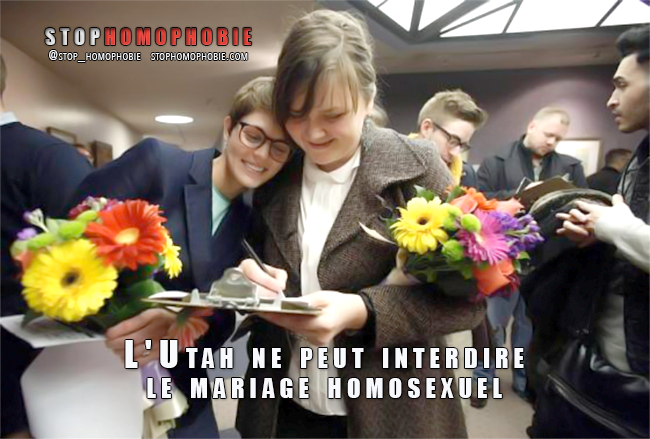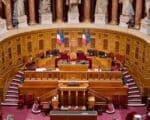Le juge Robert J. Shelby affirme que la loi, adoptée par référendum en 2004, porte atteinte au droit des couples homosexuels à bénéficier de la même protection que les hétérosexuels, en vertu du 14e amendement de la Constitution américaine. Les militants des droits des homosexuels ont salué la décision, qui tombe au lendemain de la légalisation du mariage gay dans l’Etat voisin du Nouveau-Mexique, mais les autorités de l’Utah ont immédiatement fait appel de la décision.
« Peu de sujets sont aussi lourds politiquement dans le climat actuel, écrit le juge. C’est particulièrement vrai [dans les Etats] où l’électorat a pris la parole démocratiquement en organisant un référendum sur le sujet ». Le juge répondait à une plainte déposée par trois couples de gays et lesbiennes souhaitant se marier dans l’Utah.
ATTEINTE À LA DIGNITÉ DES COUPLES DE MÊME SEXE
« Le problème légal soulevé par ce procès n’est pas lié au fait que les lois de l’Utah soient ou non le résultat du travail parlementaire ou d’un référendum, ou que les lois soient adoptées largement ou de justesse, écrit le juge Shelby. La question soulevée ici dépend de la Constitution américaine », ajoute-t-il.
Les lois en vigueur dans l’Utah « nient le droit fondamental des gays et lesbiennes à pouvoir se marier et, par conséquent, rabaissent la dignité des couples de même sexe. En conséquence, la cour juge ces lois anticonstitutionnelles », poursuit-il.
Aux Etats-Unis, les lois régissant le mariage sont du ressort des Etats et près de 30 d’entre eux ont adopté des textes limitant le mariage aux couples hétérosexuels. Jeudi, le Nouveau-Mexique a rejoint seize autres Etats, ainsi que la capitale fédérale Washington, où les gays et les lesbiennes peuvent se marier, parmi lesquels la Californie et New York.
L’année 2013 a été faste pour les droits des homosexuels, au niveau des Etats comme au niveau fédéral. En juin, la Cour suprême des Etats-Unis avait abrogé la loi dite de Défense du Mariage (DOMA), qui privait les couples homosexuels des droits fédéraux accordés au couples mariés hétérosexuels.
>> A federal judge struck down Utah’s ban on same-sex marriage as unconstitutional on Friday, handing a major victory to gay rights activists in a conservative state where the Mormon church wields considerable influence.
U.S. District Judge Robert Shelby, ruling in a lawsuit brought by three gay couples, found that an amendment to the Utah Constitution defining marriage as exclusively between a man and a woman violated the rights of gay couples to due process and equal protection under the U.S. Constitution.
« The state’s current laws deny its gay and lesbian citizens their fundamental right to marry and, in doing so, demean the dignity of these same sex couples for no rational reason. Accordingly, the court finds that these laws are unconstitutional, » Shelby said.
The judge’s 53-page written decision barred the state from enforcing its ban and adds to growing momentum toward legalizing gay marriage across the nation.
It also touched off an immediate rush to the altar by gay couples, especially in Salt Lake City, where a festive atmosphere broke out in the county government building that played host to a string of impromptu weddings – including that of a state senator to his longtime partner.
But a spokesman for the state’s Attorney General’s office said lawyers would seek an emergency stay of the judge’s order while the office appealed to a higher court.
« I am very disappointed an activist federal judge is attempting to override the will of the people of Utah, » said Utah Governor Gary Herbert. I am working with my legal counsel and the acting attorney general to determine the best course to defend traditional marriage within the borders of Utah. »
The ruling, if it is not stayed by a higher court, would make Utah the 18th U.S. state to allow same-sex nuptials, adding to a growing number that have seen gay marriage legalized in recent months.
On Thursday, the New Mexico Supreme Court ruled to allow same-sex marriage across that state, ending legal ambiguity on the issue there. Last month, the governors of Hawaii and Illinois both signed bills to legalize same-sex weddings.
Shelby, in finding for the plaintiffs in the Utah case, rejected arguments by the state that it had the right to define marriage free of interference from the federal government.
« The court agrees with Utah that regulation of marriage has traditionally been the province of the states, and remains so today, » Shelby wrote. But he said any state regulations must still comply with the U.S. Constitution.
‘IT FEELS UNREAL’
The three couples who sued to overturn Utah’s same-sex marriage ban all live in Utah. One couple, Karen Archer and Kate Call, were married in Iowa, which allows gay marriage, but want their union to be recognized in Utah. The other two couples were denied marriage licenses by the Salt Lake County Clerk’s Office, according to court papers.
« It feels unreal, » plaintiff Moudi Sbeity, who sued along with partner Derek Kitchen, told the Salt Lake Tribune newspaper after Shelby’s ruling. « I’m just very thrilled that Derek and I will be able to get married soon, if all goes well and the state doesn’t appeal. »
Couple J. Seth Anderson, 31, and Michael Ferguson, 32, said they were the first to wed, after getting a text message from an attorney friend about the ruling and rushing to the county government building in their jeans and sweatshirts.
Salt Lake City Mayor Ralph Becker, meanwhile, officiated the wedding of State Senator Jim Dabakis to his partner of 27 years Stephen Justesen in an atrium at the county building.
Dabakis said after marrying Justesen, who is an art dealer, that he never wanted to get married in any other state than Utah, and that he was disappointed the governor is seeking to overturn the ruling.
« I guess I won’t be getting a wedding present (from the governor), » Dabakis joked.
In a sign of their hurry to wed, many were dressed informally, with one woman arriving in hospital scrubs. Salt Lake County deputy clerk Dahnelle Burton-Lee said county officials had not kept count of licenses handed out.
Same-sex couples also tried to obtain marriage licenses in Weber County, Washington County, Davis County and Utah County, but clerks there turned them away on the grounds that they needed to see the federal court ruling and evaluate it, said Kent Frogley, vice chairman of the board of the Utah Pride Center, a gay advocacy group.
Lawmakers in Utah, home to the Church of Jesus Christ of Latter-Day Saints, had passed laws to prohibit gay marriage, and voters in 2004 approved an amendment to the state constitution restricting marriage to the union between a man and a woman.
The Mormon church, which has softened its stance on homosexuality in recent years, saying the origins of sexuality are not fully understood, was not a party to the lawsuit but wields considerable influence in the state.
« The Church has been consistent in its support of traditional marriage while teaching that all people should be treated with respect, » a church spokesman said. « We continue to believe that voters in Utah did the right thing by providing clear direction in the state constitution that marriage should be between a man and a woman and we are hopeful that this view will be validated by a higher court. »
The church has previously endorsed Utah laws to protect LGBT people from job and housing discrimination and in 2010 denounced gay bullying. (Reporting by Alex Dobuzinskis and Dan Whitcomb; Writing by Dan Whitcomb; Editing by Cynthia Johnston, Leslie Gevirtz, David Gregorio and Eric Walsh)


















